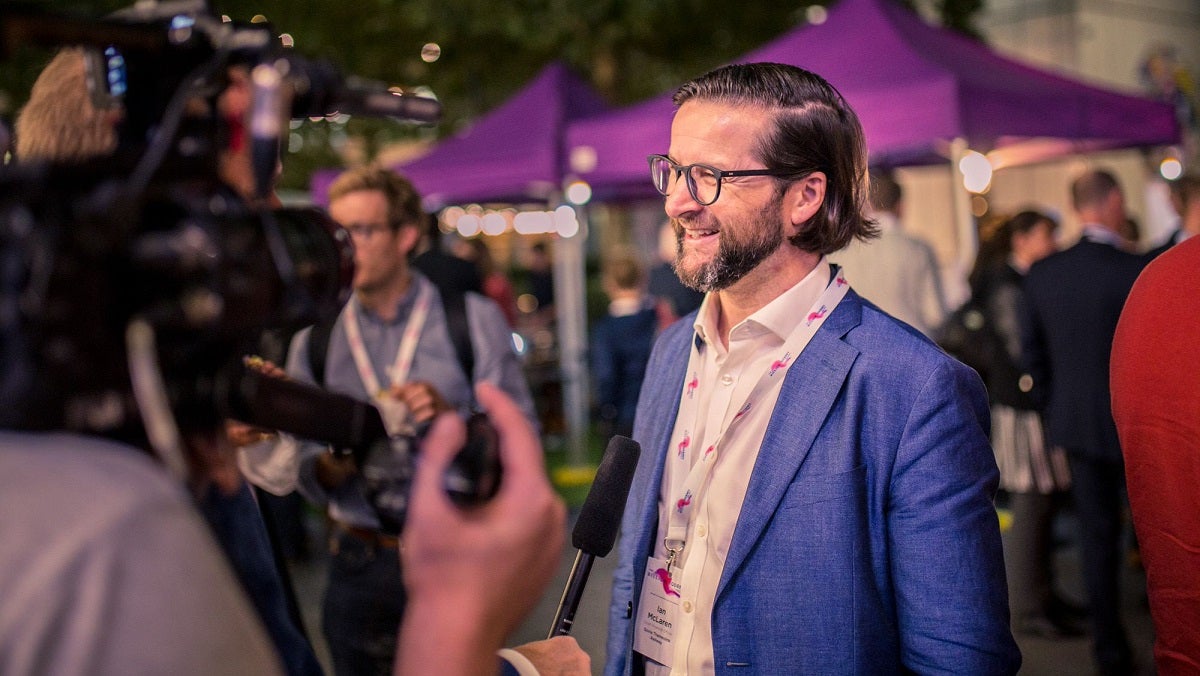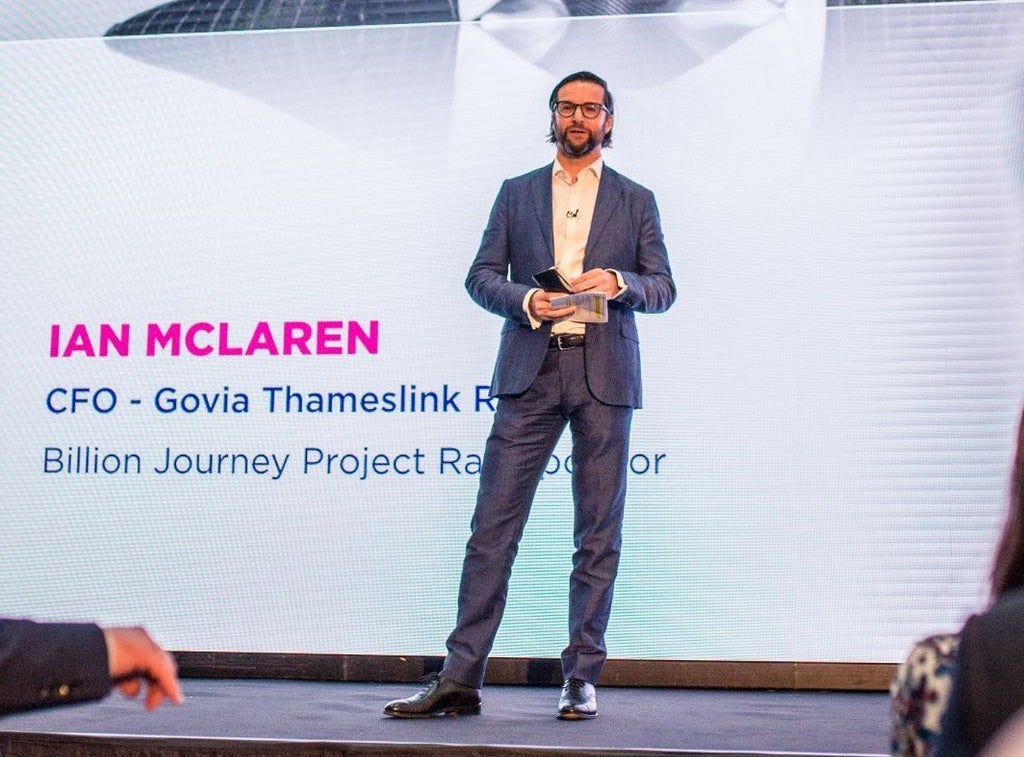
Drag queens, diversity and inclusion, and data-driven decisions are unlikely to be among the first words you would associate with a typical chief financial officer (CFO). However, Govia Thameslink Railway’s Ian McLaren is far from a stereotypical CFO, although he argues no such thing exists in 2021.
As the 52-year-old cycling enthusiast, who took up his position at GTR in December 2017, can attest, the tumultuous events of the past year have elevated the role of CFOs and significantly expanded their list of responsibilities, across the board. “When I started at GTR, my remit was a lot simpler and I was focusing on a narrow scope of my skillset, whereas now I’m using a much broader range,” he says.
“Today, it’s more about the human side of things, thinking about very practical stuff: keeping almost 8,000 colleagues safe while being able to carry out their duties, alongside supporting the varying ambitions of stakeholders and looking for opportunities to create value.”
The inference is the train has left the station for those who still believe a CFO’s primary journey is counting the beans. Business continuity has been paramount through the coronavirus crisis and those in McLaren’s position, at their respective organisations, have become more central to steering strategy.
Considering GTR, which handles 250 locations and some of the busiest train stations in London, went from “moving over a million people” in and out of the capital on a normal day, pre-pandemic, to footfall crashing by 95 per cent when the first lockdown was enforced in late-March, it has been a mighty challenge to get the business back on track.
Broader range of skills required
Connecting with, and looking after, customers and staff alike has enabled McLaren to navigate a quicker route to recovery. “As an organisation, we are looking to build back better, greener and faster,” he says, “and part of that is drawing on the ability to listen and adapt.”
Today, it’s more about the human side of things, keeping colleagues safe while supporting the varying ambitions of stakeholders and looking for opportunities to create value
A good handle on technology also augments modern CFOs and, most importantly, their employers. McLaren has this in spades; his curriculum vitae lists two-year stints as CFO and head of finance at Nomad Digital and Digital Barriers, respectively. Indeed, he has been in the driving seat for GTR’s digital transformation journey, which began in 2017, and it “came into its own” last year, allowing colleagues to “work with technology in an untethered way”.
Further, through utilising products provided by technology partner Microsoft, McLaren and his fellow GTR strategists can gain “real-time insights that have led to data-driven decisions”. He says: “These insights have meant our colleagues can optimise their time on the ground and it has empowered people to do the job we’ve required of them, which has been ever-changing.”
Dealing with the pandemic has taught us that our ability to change can move at lightning pace, so over the next five years we need to become very good at rethinking everything we think we know
Since the first lockdown, that agility and flexibility, following the data, has been vital for GTR’s service operation and particularly for hospital staff and those they aid. “We realised there are nearly 70 NHS trusts across our network, and first-responders and critical workers relied on the train service, so we adapted our timetable predominantly for them,” says McLaren. “We became more of an off-peak rather than a commuter service. The old rush-hour peak has disappeared and now travel patterns are more evenly spread throughout the day.”
Value-creation officers: open to innovation
A suite of new digital applications has minimised disrupted running of services. These include an app, introduced in May, that indicates to train drivers and station staff how recently a long-lasting virucide, designed to stick to surfaces and kill viruses, including COVID-19, for up to 30 days, has been applied.
“It has given all our colleagues confidence about going into a clean workplace,” says McLaren. Another app allows GTR staff to access the latest Public Health England information about the pandemic and report sickness and absence from work, thereby limiting potential bottlenecks.
“Technology has helped us all throughout the pandemic and understanding technology is increasingly important for CFOs and others in executive positions,” he says. “I’m lucky because tech has been my background, but it’s essential to know the risks associated with technology and cybersecurity especially. I would encourage all organisations to think more like technology companies, but being technology-savvy certainly raises a CFO’s stock.
“Dealing with the pandemic has taught us that our ability to change can move at lightning pace, so over the next five years we need to become very good at rethinking everything we think we know.”
McLaren, who has thrice cycled from Land’s End to John o’ Groats, owns ten bikes of various vintages, the oldest being a 1935 “speed racer”, and regularly clocks up 200 miles a week, finds strategy brainwaves often hit him when pedalling.
The secret is being open to innovation and new ideas. “Some might think the finance director is there to say ‘no’ and it’s all about cost-cutting. But to me, it’s more about value creation; we are becoming value-creation officers,” he says, suggesting that adopting a “beginner’s mindset to everything” helps in the current CFO’s role.
Invest in employees
“If you consider yourself an expert then you are closed to many things,” he adds. “I try to approach things with novelty and understand the art of the possible.”
Ultimately, the success or failure of an organisation is down to its employees, argues McLaren. “You have to understand the business and, more importantly, what makes its people tick.” Hence, he is passionate about diversity and inclusion, and keen to invest in and join events that “demonstrate my more human, fun side”.
For example, he and his daughter have recently enjoyed tuning in to virtual drag queen shows, featuring the amusingly monikered Annabelle Lecter, put on for GTR’s LGBT+ Network. “Spending a tiny amount on a diversity and inclusion event is nothing compared to the huge value it generates to us as a business,” says McLaren.
“It’s intangible, but you know you are creating something quite special when you see the brilliant reactions from colleagues, which then resonates with their service to customers.”
The anatomy of the modern CFO

The chief financial officer’s role has evolved somewhat since Ian McLaren gained his accountancy qualification over three decades ago; finance credentials alone are no longer sufficient.
“Today, finance roles need to be augmented with many more skills,” says Govia Thameslink Railway’s CFO. He suggests, in addition to being good with numbers, the modern CFO must understand legal and broader governance issues, and be technology savvy, not least to manage cybersecurity risks and data. On top of being able to structure commercial deals, they ought to be excellent negotiators too.
In terms of personality traits, the best CFOs are armed with “a good sense of humour, can understand and show humility, and have tenacity”, says McLaren. Further, given the business agility necessitated by the pace of change, they require a certain amount of creativity, plus an openness and a “growth mindset” that enables them “to question, listen and rethink” strategies and business models.
Being a courageous leader, who can communicate with and energise colleagues and those across the business, is increasingly valuable for a CFO. “Having good people skills is essential,” McLaren concludes. “This skill helps with negotiation and, if you can be authentic and intentional, it will inspire those around you.”

Drag queens, diversity and inclusion, and data-driven decisions are unlikely to be among the first words you would associate with a typical chief financial officer (CFO). However, Govia Thameslink Railway’s Ian McLaren is far from a stereotypical CFO, although he argues no such thing exists in 2021.
As the 52-year-old cycling enthusiast, who took up his position at GTR in December 2017, can attest, the tumultuous events of the past year have elevated the role of CFOs and significantly expanded their list of responsibilities, across the board. “When I started at GTR, my remit was a lot simpler and I was focusing on a narrow scope of my skillset, whereas now I’m using a much broader range,” he says.
“Today, it’s more about the human side of things, thinking about very practical stuff: keeping almost 8,000 colleagues safe while being able to carry out their duties, alongside supporting the varying ambitions of stakeholders and looking for opportunities to create value.”
